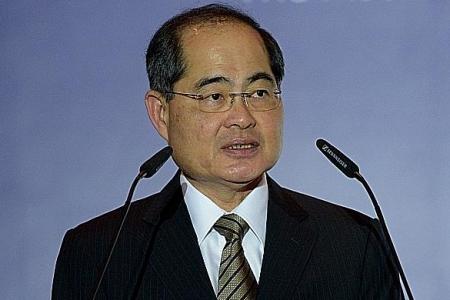US investment, trade in Asean must continue
Trade Minister Lim Hng Kiang urges American-Asean collaboration
The show must go on for American trade and investment in Asean, even with the United States pulling out of the Trans-Pacific Partnership (TPP) agreement earlier this year.
This point was made by Minister for Trade and Industry (Trade) Lim Hng Kiang during a session with members of the American business community at the Four Seasons Singapore hotel yesterday.
Mr Lim told the gathering: "Particularly in this increasingly digitalised global environment, we will need to work together to leverage our strengths, learn from each other's best practices and streamline our regulatory regimes to enhance the opportunities for business."
In his election campaign, US President Donald Trump had run on an anti-TPP platform and axed the deal during his first days in office.
Ms Stephanie Syptak-Ramnath, charge d'affaires at the US Embassy in Singapore, acknowledged yesterday the "disappointment" caused by Mr Trump's decision.
"Whether in skills training, technology or corporate social responsibility, US companies make a positive difference in the communities where they invest," she said. "That is, in my view, one of the best responses that I can give when people ask about the impact of US withdrawal from TPP."
She added: "The United States government remains committed to Asean and to supporting our companies...
"We are certainly comfortable with the other signatories to the TPP continuing their cooperation as a step towards further progress."
"Ideally, of course, we would love to see the TPP-12 ratified. But we are all adults and we have to move on."Mr Lim Hng Kiang, Minister for Trade and Industry (Trade)
Alternatives on the table include the TPP-11, a trade set-up comprising the remaining parties in the failed deal, as well as the proposed Regional Comprehensive Economic Partnership (RCEP), which would feature Asean, China, Japan, South Korea, India, Australia and New Zealand - but not the US.
Mr Lim said: "We are very grateful for the strong support expressed by the business community on our efforts to continue with raising the standards of rules, and to facilitate trade and investment in the region through the TPP-11. Ideally, of course, we would love to see the TPP-12 ratified. But we are all adults and we have to move on."
He noted that there is a "very strong" political will to reach the TPP regime's aim of business-friendly regulatory standards and he hopes that progress will be made by November's Asia-Pacific Economic Cooperation leaders' meeting in Da Nang.
Mr Lim was at the Four Seasons for the launch of results from a survey of regional business expectations, commissioned by the US Chamber of Commerce and American Chamber of Commerce in Singapore.
The poll of 317 senior executives of US firms across the region found that American businesses fretted over losing out amid the rise of China, the world's second-largest economy.
Almost half, or 48 per cent, of respondents expected stronger ties between Beijing and their countries of operation.
Trade between the US and Asean hit US$230 billion (S$309.6 billion) last year, while foreign direct investment in the region stood at US$306 billion.
Mr Lim noted that Singapore holds a lion's share of both.
Get The New Paper on your phone with the free TNP app. Download from the Apple App Store or Google Play Store now

